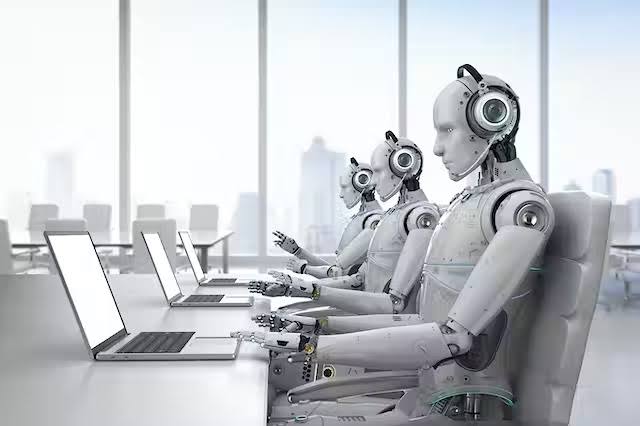Highlights
• Jobs in data entry and processing, customer service, driving, manufacturing, and administrative tasks face threat of being replaced by AI and Chat GPT technology.
•AI tools and chatbots can improve efficiency in administrative tasks, but jobs that require creativity, emotional intelligence, and critical thinking are unlikely to be replaced by machines anytime soon.
•Workers should stay up-to-date with advancements in technology and be proactive in adapting their skills and knowledge to prepare for the jobs of the future, while also considering the ethical and societal implications of these technologies.
As technology continues to advance at a rapid pace, the question arises as to which jobs and activities are most susceptible to being replaced by Artificial Intelligence (Al) and Chat Generative Pre-trained Transformer (Chat GPT).
Technological advancement has led to changes in the job market and shift in the types of skills that are in demand.
Join our WhatsApp ChannelThis article discusses the present and future impact of Al and Chat GPT on various job sectors and activities.
Data Entry and Processing: Automating Repetitive Tasks
Jobs that involve data entry and processing, such as clerks and book keepers, are at risk of being replaced by automation. Computers can process large amounts of data quickly and accurately, which makes them well-suited for tasks such as data entry and record keeping. However, some jobs in this field may require more complex analysis and decision-making, which would be more difficult to automate.
Customer Service: Emergence of Chatbots and Other AI-Based Systems
Chatbots and other forms of Al are already being used by some companies to handle routine customer inquiries and support requests. While these systems may not be perfect, they are improving rapidly and are likely to become more common in the future. However, some customers may prefer to speak with a human representative, especially for more complex issues. So it’s likely that there will always be a need for human customer service representatives in some capacity.
Driving: Self-Driving Vehicles are a Reality
Self-driving cars and trucks are becoming more common in some parts of the world. This could have an impact on jobs that involve driving, such as truck drivers, taxi drivers, and delivery workers. However, this technology is still in its early stages, and there are many challenges that need to be overcome before self-driving vehicles become widespread. Also, legal and regulatory barriers need to be addressed before self-driving vehicles become commonplace.
Manufacturing and Assembly Line Work: Machines Taking on More Complex Tasks
Machines have been used to automate certain tasks in manufacturing and assembly line work for many years. However, recent advancements in robotics and Al are making it possible for machines to take on more complex tasks, such as quality control and inspection. This may lead to a decrease in the number of jobs available in this field, but it’s important to note that machines cannot completely replace human workers in this field. Human workers are still needed to oversee and manage the production process.
Administrative Tasks: AI Tools and Chatbots for Improved Efficiency
Al tools and chatbots can be effective at handling administrative tasks, such as scheduling appointments and managing email. This may free up human workers to focus on more complex and creative work. However, some administrative tasks require human interaction and judgment, which would be difficult to automate. Furthermore, many workers may prefer to handle these tasks themselves rather than rely on Al tools and chatbots.
Writing and Content Creation: A New Era of Creativity
Al language models, such as ChatGPT, are capable of generating text that is similar to human writing. While it’s unlikely that Al will replace human writers and content creators completely, certain types of writing, such as news articles and product descriptions, could become automated. Writing requires creativity, critical thinking, and emotional intelligence, which are skills that machines are not good at.
Conclusion: A New Job Market and the Need for Up-Skilling
While Al and Chat GPT may impact certain jobs and activities, there will always be a need for human workers in many fields. Jobs that require creativity, emotional intelligence, and critical thinking are unlikely to be replaced by machines anytime soon. It’s important for workers to stay up-to-date with advancements in technology and prepare themselves for the jobs of the future. This may involve developing new skills, pursuing education and training opportunities, That being said, it’s important to recognize that the job market will continue to evolve as technology advances. It’s possible that new jobs and industries will emerge, while others may decline or disappear altogether. It’s important for individuals to be proactive in staying ahead of these changes and adapting their skills and knowledge accordingly.
In addition to the impact on the job market, the rise of Al and chat GPT also raises important ethical and societal questions. For example, there are concerns about the potential for these technologies to perpetuate bias or exacerbate inequality. It’s important for researchers, policymakers, and individuals to consider these issues and work towards creating a future where technology is used in a way that benefits everyone.
In conclusion, while Al and chat GPT are likely to impact certain jobs and activities in the coming years, it’s important to keep in mind that these technologies are tools that can be used to augment human abilities rather than replace them. By staying informed and proactive, individuals can position themselves for success in a rapidly changing job market and help ensure that technology is used in a way that benefits society as a whole.

















Follow Us